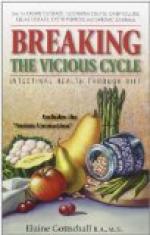There is a good deal of effort expended by many semi-educated individuals to discredit the knowledge of calories, saying that it is a foolish food science, a fallacy, a fetish, and so forth.
They reason, or rather say, that because there are no calories in some of the very vital elements of foods—the vitamines and the mineral salts—therefore it is not necessary to know about them. They further argue that their grandfathers never heard of calories and they got along all right. That grandfather argument always enrages my mortal mind.
[Sidenote: A Unit of Measure]
Now you know that a calorie is a unit of measuring heat and food. It is not heat, not food; simply a unit of measure. And as food is of supreme importance, certainly a knowledge of how it should be measured is also of supreme importance.
[Sidenote: Yes, They Are Kosher]
You should know and also use the word calorie as frequently, or more frequently, than you use the words foot, yard, quart, gallon, and so forth, as measures of length and of liquids. Hereafter you are going to eat calories of food. Instead of saying one slice of bread, or a piece of pie, you will say 100 Calories of bread, 350 Calories of pie.
The following is the way the calorie is determined:
An apparatus known as the bomb calorimeter has two chambers, the inner, which contains the dry food to be burned, say a definite amount of sugar, and an outer, which is filled with water. The food is ignited with an electric connection and burned. This heat is transferred to the water. When one pound of water is raised 4 degrees Fahrenheit, the amount of heat used is arbitrarily chosen as the unit of heat, and is called the Calorie.
Food burned (oxydized) in the body has been proved to give off approximately the same amount of heat or energy as when burned in the calorimeter.
[Sidenote: Approximate Measures]
1 oz. Fat
= 275 C.
—about 255
in the body.
1 oz. Protein (dry)
= 120 C.
—about 113
in the body.
1 oz. Carbohydrates (dry)
= 120 C.
—about 113
in the body.
(ROSE.)
Can you see now why fats are valuable? Why they make fat more than any other food? They give off more than two and one-fourth times as much heat, or energy, as the other foods.
[Sidenote: See Next Chapter for Definitions]
Notice that protein and carbohydrates have the same food value as to heat or energy, each 113 Calories to the dry ounce. However, they are not interchangeable; that is, carbohydrates will not take the place of protein for protein is absolutely necessary to build and repair tissue, and carbohydrates cannot do that. But fats and carbohydrates are interchangeable as fuel or energy foods.
Calories Needed per Day for Normal Individuals
[Sidenote: Business of Growing]




